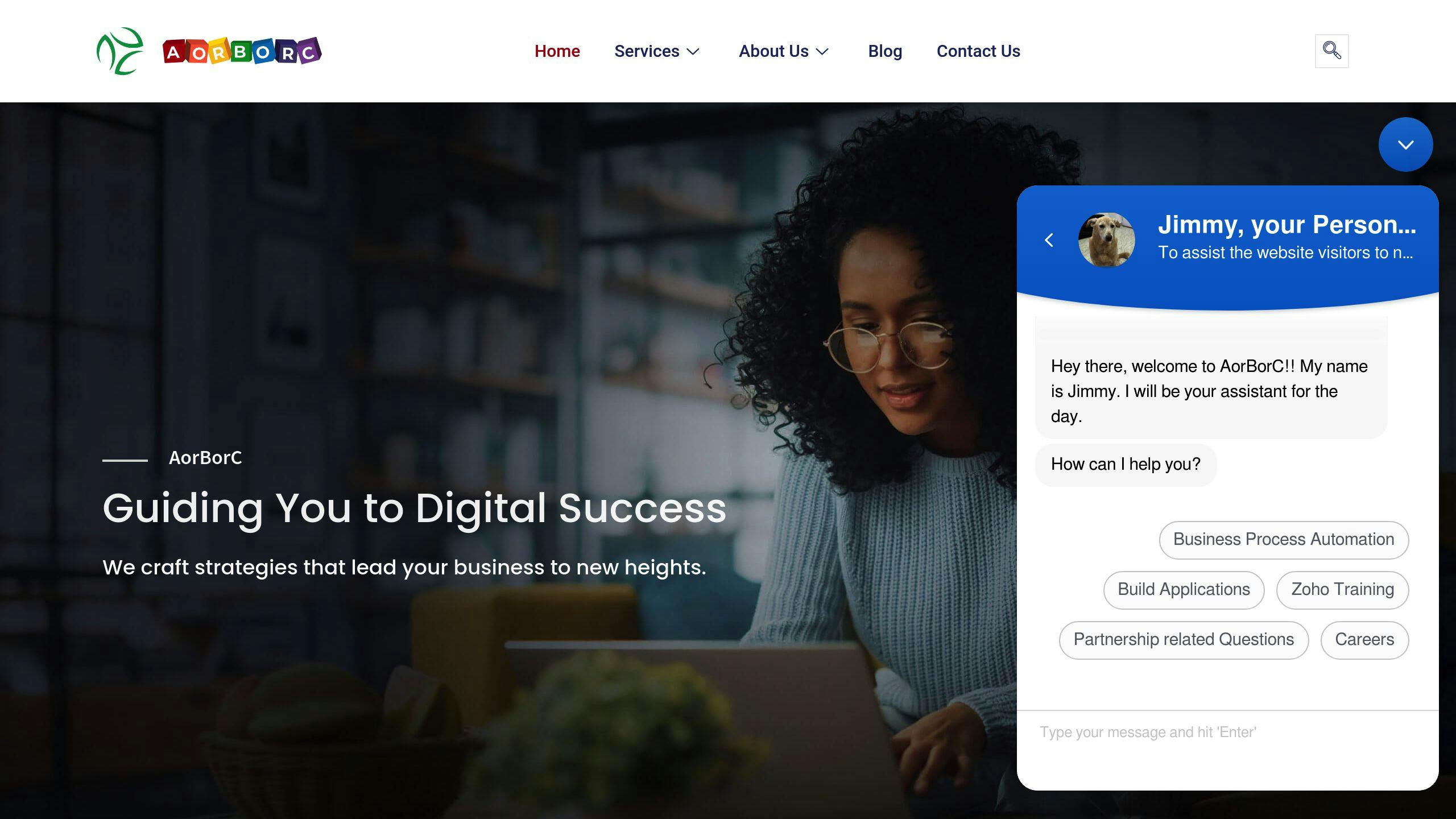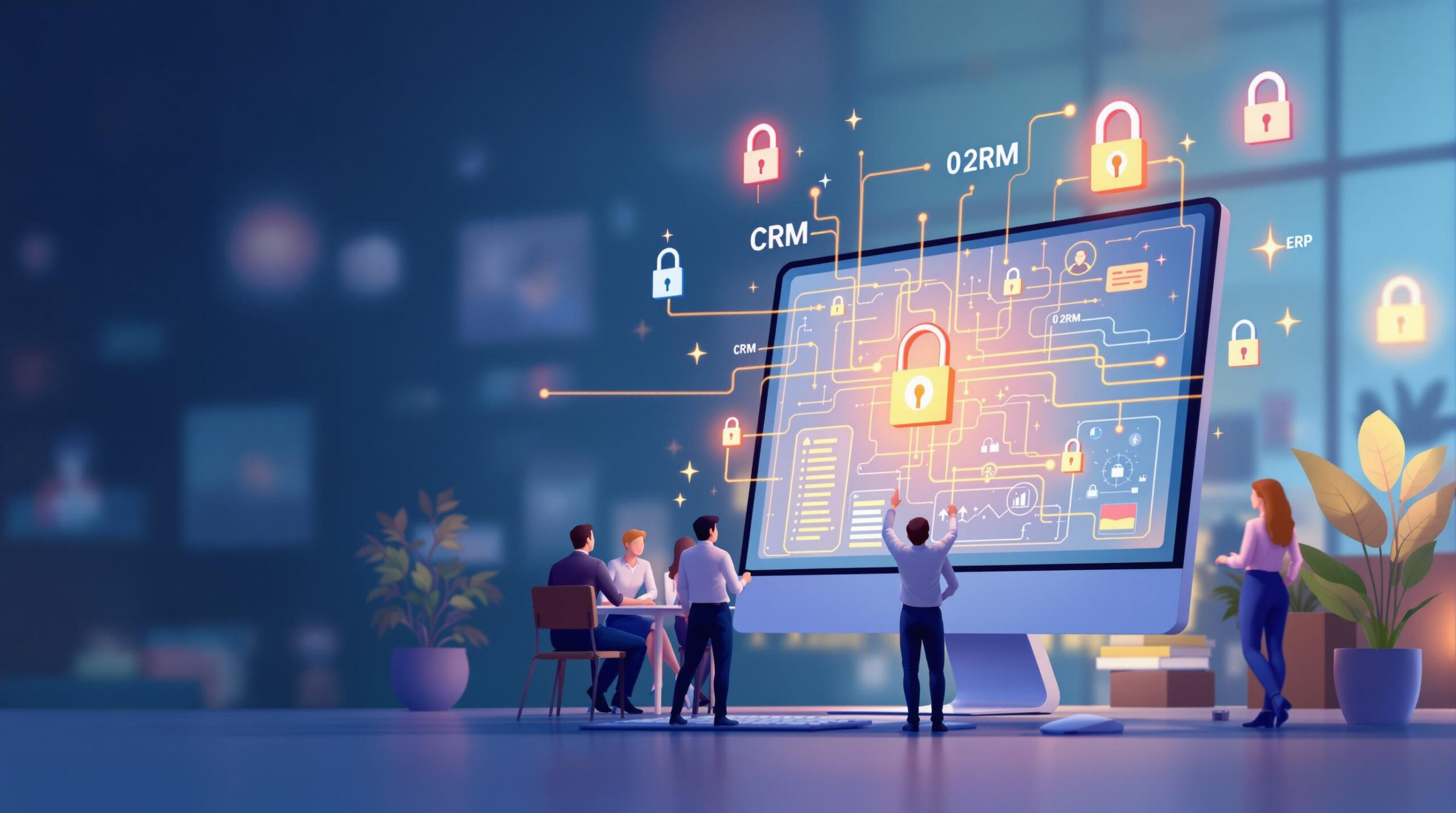Securing data during CRM-ERP integrations is critical because these systems handle sensitive information like customer details and financial records. Without proper security, organizations risk breaches, financial loss, and legal penalties. Here’s how you can protect your data effectively:
- Encrypt Data: Use encryption methods like AES for stored data and SSL/TLS for data in transit.
- Strengthen Authentication: Implement OAuth 2.0, API key rotation, and multi-factor authentication.
- Monitor in Real-Time: Track API traffic, validate data, and maintain access logs to detect threats early.
- Ensure Compliance: Follow regulations like GDPR, HIPAA, and PCI-DSS with regular audits and governance.
- Leverage iPaaS Tools: Use platforms with built-in encryption, pre-made connectors, and monitoring features.
These actions, combined with regular system updates and collaboration across departments, can help secure your integration and maintain trust in your systems.
Common Security Challenges in CRM-ERP Integrations
Integrating CRM and ERP systems comes with its fair share of security challenges, many of which can put sensitive data at risk. In fact, 66% of companies still rely on outdated ERP systems, making these integrations even more vulnerable.
Risks of Data Exposure in Integration
Data exposure is a major concern when connecting CRM and ERP systems. Weak encryption and poorly configured APIs can leave data open to interception and unauthorized access.
"ERP security is a huge deal as your ERP system houses all your business’s critical information, so keeping it safe is hugely important to your business’s cybersecurity." – Datix, an Infor partner and expert in Epicor ERP.
Authentication protocols are another weak spot. If one system uses modern methods like OAuth 2.0 while the other relies on outdated authentication, it creates gaps that attackers can exploit.
Here’s a breakdown of common risks and how they can affect your integration:
| Risk Type | Potential Impact | Security Consideration |
|---|---|---|
| API Vulnerabilities | Unauthorized data access | Rotate API keys regularly and use strong authentication |
| Data Format Mismatches | Data corruption and errors | Enforce consistent data formatting standards |
| Encryption Gaps | Data interception during transfer | Implement end-to-end encryption |
System Compatibility Issues
Compatibility issues between CRM and ERP systems add another layer of security challenges. Disparate system architectures, especially involving legacy systems, often lead to vulnerabilities.
For example, mismatched data formats – like differing date formats or field lengths – can cause data corruption or truncation. These issues not only disrupt workflows but can also expose sensitive information.
Outdated systems can also compromise security protocols. If your ERP system is running an older version of SQL Server, it might lack essential encryption features, leaving your data vulnerable during integration.
To tackle these challenges, organizations should focus on:
- Keeping systems updated and enforcing standardized data protocols.
- Conducting regular security audits to identify weak points.
- Ensuring authentication methods are aligned across systems.
AorBorC Technologies offers tailored services to address these issues, ensuring Zoho CRM and ERP systems work together securely while protecting data throughout the integration process.
Proactive steps are essential to overcoming these challenges, and we’ll dive into those strategies in the next sections.
Steps to Secure Data in CRM-ERP Integrations
Using Encryption for Data Protection
Encryption plays a key role in protecting data during CRM-ERP integrations. It safeguards information both while it’s stored and when it’s being transmitted, helping to reduce risks like API vulnerabilities.
For example, Microsoft Dynamics 365 employs robust encryption methods. It uses SQL Server cell-level encryption to protect sensitive data and Transparent Data Encryption (TDE) to secure data at rest in real time.
| Encryption Type | Purpose | How It’s Used |
|---|---|---|
| Symmetric (AES) | Encrypts large volumes of data | Applied at the database and file level |
| Asymmetric (RSA) | Secures key exchanges | Used for API authentication and secure communications |
| SSL/TLS | Protects data during transmission | Ensures safe network communication |
While encryption shields the data, strong authentication ensures only the right users have access.
Implementing Strong Authentication
OAuth 2.0 is widely regarded as the go-to framework for secure API integration. To strengthen access control, consider using tools like API key rotation, multi-factor authentication, and role-based permissions.
Monitoring and Validating Data in Real-Time
Real-time monitoring is essential for identifying and addressing security threats before they turn into major issues.
"No system or dataset is 100 percent safe", says Datix, emphasizing the importance of continuous monitoring for integration security.
| Monitoring Area | Strategy | Benefit |
|---|---|---|
| API Traffic | Use rate limits and analyze patterns | Prevents unauthorized access and DDoS attacks |
| Data Validation | Perform real-time integrity checks | Maintains data accuracy and reliability |
| Access Logs | Maintain a continuous audit trail | Speeds up threat detection and response |
Combining these practices with compliance standards ensures a solid foundation for secure CRM-ERP integrations.
Compliance and Data Governance in CRM-ERP Integrations
Building on real-time monitoring, compliance and governance are crucial for maintaining security and meeting legal requirements over the long term.
Meeting Regulatory Standards
Staying compliant with regulations is a must for secure CRM-ERP integrations. For instance, failing to comply with GDPR can lead to fines as high as €20 million or 4% of global turnover. This highlights the need for robust security practices.
Key regulations like GDPR, HIPAA, and PCI-DSS require encryption, strict access control, and secure data handling during integrations:
| Regulation | Requirements | Impact on Integration |
|---|---|---|
| GDPR | Explicit consent, data protection | Necessitates encryption and access controls for EU data |
| HIPAA | Secure handling of health information | Requires specialized processes for healthcare data |
| PCI-DSS | Protection of payment card data | Demands secure payment processing integration |
Conducting Regular Data Audits
Regular data audits are essential for ensuring compliance and maintaining data quality across systems. Strong data governance not only helps meet regulatory standards but also enhances overall security during integrations.
Key audit practices include:
| Audit Component | Implementation Method | Business Impact |
|---|---|---|
| Data and Compliance Checks | Use of automated tools and external audits | Ensures accuracy and regulatory compliance |
| Access Control Review | Conducted quarterly | Reduces the risk of unauthorized access |
Role-based permissions across integrated systems limit employees to accessing only the data required for their roles, significantly lowering the chances of data breaches. Healthcare organizations, in particular, must maintain detailed audit logs and follow specific encryption protocols to stay compliant with HIPAA.
sbb-itb-058cafb
Tips for Secure and Effective CRM-ERP Integration
Securing CRM-ERP integration requires more than just compliance measures. Practical strategies and teamwork play a big role in ensuring both security and efficiency.
Using iPaaS for Integration
iPaaS platforms make CRM-ERP integration easier and safer by offering features like encryption, pre-made connectors, and real-time monitoring.
| iPaaS Security Feature | Benefit | Implementation Impact |
|---|---|---|
| Built-in Encryption | Keeps data safe during transfer and storage | Cuts down custom security development by 60-70% |
| Pre-built Connectors | Works seamlessly with popular systems | Reduces errors and security gaps during integration |
| Real-time Monitoring | Spots unusual activity quickly | Allows for immediate action against threats |
Conducting Thorough Testing
Thorough testing is key to catching issues before going live. Use a sandbox setup to test data integrity, authentication processes, and API security without putting actual data at risk.
Collaborating Across Departments
Teamwork between departments ensures a smooth and secure integration. IT handles the technical setup, compliance ensures rules are followed, and operations focus on managing access.
| Department | Role in Integration | Security Responsibility |
|---|---|---|
| IT | Handles technical setup | Secures infrastructure and encryption protocols |
| Compliance | Ensures regulatory compliance | Oversees data protection and audits |
| Operations | Manages daily use | Enforces access controls and security policies |
How AorBorC Technologies Supports Secure CRM-ERP Integrations

When it comes to CRM-ERP integrations, security is a big concern. Businesses need partners who can safeguard their data without causing disruptions. That’s where AorBorC Technologies steps in. They specialize in creating secure, customized solutions that keep your data safe while ensuring smooth operations.
AorBorC Technologies: Strengthening Integration Security

AorBorC Technologies takes a focused, three-step approach to tackle integration security:
| Security Component | Business Impact |
|---|---|
| Data Protection | Protects sensitive information with advanced encryption, ensuring compliance. |
| System Integration | Minimizes risks by using secure APIs and connectors. |
| Ongoing Monitoring | Continuously defends against threats with real-time detection systems. |
By addressing risks like API vulnerabilities and compliance issues, AorBorC Technologies ensures your systems are connected securely and efficiently. Their expertise in Zoho CRM customization includes features like advanced authentication and secure data transfer, all while maintaining system performance.
For ERP systems, their focus remains on security. They implement secure APIs, role-based access controls, and ensure regulatory compliance. Here’s a closer look at their methods:
| Security Feature | Purpose | Implementation Benefit |
|---|---|---|
| Zero-Trust Architecture | Verifies every access request | Reduces the risk of unauthorized access. |
| Automated Monitoring | Tracks system activity in real-time | Speeds up responses to potential threats. |
| Custom Security Protocols | Solves unique integration challenges | Balances compliance with operational needs. |
The technical team at AorBorC Technologies tailors security solutions to fit each client’s specific requirements. With continuous monitoring and regular assessments, they help businesses stay ahead of emerging threats and maintain strong security measures over time.
Key Points for Securing CRM-ERP Integrations
Protecting CRM-ERP integrations involves a mix of encryption, strong authentication methods, and continuous monitoring. Together, these steps safeguard sensitive information during the integration process. Adhering to regulations like GDPR and HIPAA is also essential, as failing to comply can lead to hefty fines and damage to a company’s reputation.
| Security Pillar | Key Action & Benefit |
|---|---|
| Data Protection | Use advanced encryption to block unauthorized access. |
| Compliance Management | Conduct regular audits to stay aligned with regulations. |
| System Security | Implement OAuth 2.0 for secure API authentication. |
| Monitoring | Use real-time validation to spot and address threats quickly. |
Specialized tools, such as iPaaS platforms, and expert guidance can simplify the process, helping businesses meet security demands without sacrificing efficiency. Performing regular audits and updates ensures your integration remains resilient against new threats.

